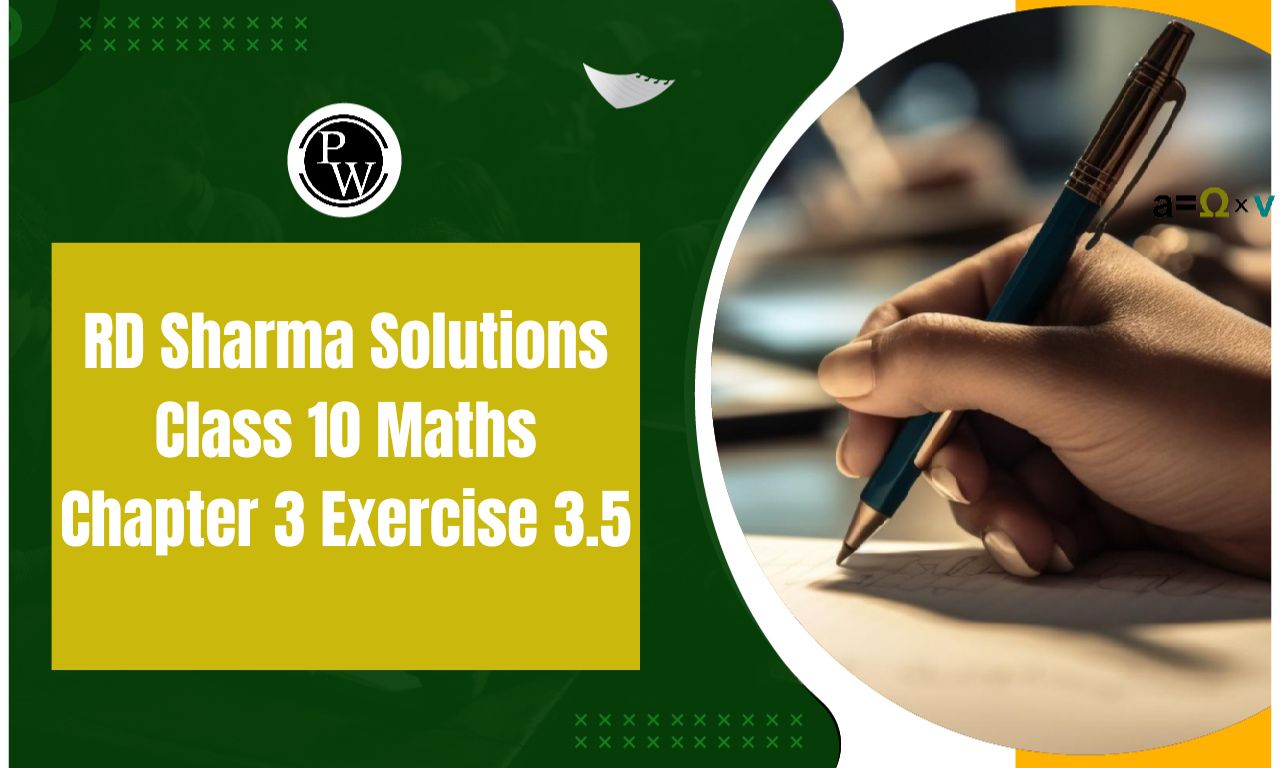

RD Sharma Solutions Class 10 Maths Chapter 3 Exercise 3.5: Exercise 3.5 of RD Sharma's Class 10 Maths Chapter 3, Pair of Linear Equations in Two Variables, focuses on solving linear equations graphically. This exercise helps students understand the concept of graphically representing two equations as straight lines on a graph and finding their intersection point, which represents the solution to the pair.
RD Sharma Solutions Class 10 Maths Chapter 3 Exercise 3.5 three types of solutions based on the relationship between the lines: a unique solution (intersecting lines), no solution (parallel lines), and infinitely many solutions (coincident lines). This visual approach reinforces understanding of consistency and helps in identifying the nature of solutions.RD Sharma Solutions Class 10 Maths Chapter 3 Exercise 3.5 Overview
RD Sharma's Class 10 Maths Chapter 3, Exercise 3.5, focuses on solving pairs of linear equations in two variables, a crucial concept for understanding algebra and applied mathematics. This exercise helps students learn methods like substitution, elimination, and cross-multiplication to find solutions to linear equations that represent real-world problems, such as calculating costs, distances, or relationships between quantities. Mastering these techniques is essential for tackling higher-level algebra topics and building problem-solving skills. This foundational knowledge is valuable in advanced math courses, economics, physics, and various engineering fields, where linear equations are frequently used.RD Sharma Solutions Class 10 Maths Chapter 3 Exercise 3.5 PDF
Below, we have provided the PDF for RD Sharma Class 10 Maths Chapter 3, Exercise 3.5 solutions. This exercise focuses on solving pairs of linear equations in two variables using various methods like substitution, elimination, and cross-multiplication. These solutions are designed to help students understand and practice key concepts effectively, supporting them in mastering techniques for solving linear equations step-by-step.RD Sharma Solutions Class 10 Maths Chapter 3 Exercise 3.5 PDF
RD Sharma Solutions Class 10 Maths Chapter 3 Exercise 3.5 Pair of Linear Equations in Two Variables
Below is the RD Sharma Solutions Class 10 Maths Chapter 3 Exercise 3.5 Pair of Linear Equations in Two Variables -In each of the following systems of equations, determine whether the system has a unique solution, no solution or infinite solutions. In case there is a unique solution, find it from 1 to 4:
1. x − 3y = 3
3x − 9y = 2
Solution:
The given system of equations is x − 3y – 3 = 0 3x − 9y − 2 = 0 The above equations are of the form a 1 x + b 1 y − c 1 = 0 a 2 x + b 2 y − c 2 = 0 Here, a 1 = 1, b 1 = −3, c 1 = −3 a 2 = 3, b 2 = −9, c 2 = −2 So, according to the question, we get a 1 / a 2 = 1/3 b 1 / b 2 = −3/ −9 = 1/3 and, c 1 / c 2 = −3/ −2 = 3/2 ⇒ a 1 / a 2 = b 1 / b2 ≠ c 1 / c 2 Hence, we can conclude that the given system of equations has no solution.2. 2x + y = 5
4x + 2y = 10
Solution:
The given system of equations is 2x + y – 5 = 0 4x + 2y – 10 = 0 The above equations are of the form a 1 x + b 1 y − c 1 = 0 a 2 x + b 2 y − c 2 = 0 Here, a 1 = 2, b 1 = 1, c 1 = −5 a 2 = 4, b 2 = 2, c 2 = −10 So, according to the question, we get a 1 / a 2 = 2/4 = 1/2 b 1 / b 2 = 1/ 2 and, c 1 / c 2 = −5/ −10 = 1/2 ⇒ a 1 / a 2 = b 1 / b2 = c 1 / c 2 Hence, we can conclude that the given system of equations has infinitely many solutions.3. 3x – 5y = 20
6x – 10y = 40
Solution:
The given system of equations is 3x – 5y – 20 = 0 6x – 10y – 40 = 0 The above equations are of the form a 1 x + b 1 y − c 1 = 0 a 2 x + b 2 y − c 2 = 0 Here, a 1 = 3, b 1 = -5, c 1 = −20 a 2 = 6, b 2 = -10, c 2 = −40 So, according to the question, we get a 1 / a 2 = 3/6 = 1/2 b 1 / b 2 = -5/ -10 = 1/2 and, c 1 / c 2 = -20/ −40 = 1/2 ⇒ a 1 / a 2 = b 1 / b2 = c 1 / c 2 Hence, we can conclude that the given system of equations has infinitely many solutions.4. x – 2y = 8
5x – 10y = 10
Solution:
The given system of equations is x – 2y – 8 = 0 5x – 10y – 10 = 0 The above equations are of the form a 1 x + b 1 y − c 1 = 0 a 2 x + b 2 y − c 2 = 0 Here, a 1 = 1, b 1 = -2, c 1 = −8 a 2 = 5, b 2 = -10, c 2 = -10 So, according to the question, we get a 1 / a 2 = 1/5 b 1 / b 2 = -2/ -10 = 1/5 and, c 1 / c 2 = -8/ −10 = 4/5 ⇒ a 1 / a 2 = b 1 / b2 ≠ c 1 / c 2 Hence, we can conclude that the given system of equations has no solution.Find the value of k for which the following system of equations has a unique solution: (5-8)
5. kx + 2y = 5
3x + y = 1
Solution:
The given system of equations is kx + 2y – 5 = 0 3x + y – 1 = 0 The above equations are of the form a 1 x + b 1 y − c 1 = 0 a 2 x + b 2 y − c 2 = 0 Here, a 1 = k, b 1 = 2, c 1 = −5 a 2 = 3, b 2 = 1, c 2 = -1 So, according to the question, For a unique solution, the condition is a 1 / a 2 ≠ b 1 / b 2 k/3 ≠ 2/1 ⇒ k ≠ 6 Hence, the given system of equations will have a unique solution for all real values of k other than 6.6. 4x + ky + 8 = 0
2x + 2y + 2 = 0
Solution:
The given system of equations is 4x + ky + 8 = 0 2x + 2y + 2 = 0 The above equations are of the form a 1 x + b 1 y − c 1 = 0 a 2 x + b 2 y − c 2 = 0 Here, a 1 = 4, b 1 = k, c 1 = 8 a 2 = 2, b 2 = 2, c 2 = 2 So, according to the question, For a unique solution, the condition is a 1 / a 2 ≠ b 1 / b 2 4/2 ≠ k/2 ⇒ k ≠ 4 Hence, the given system of equations will have a unique solution for all real values of k other than 4.7. 4x – 5y = k
2x – 3y = 12
Solution
The given system of equations is 4x – 5y – k = 0 2x – 3y – 12 = 0 The above equations are of the form a 1 x + b 1 y − c 1 = 0 a 2 x + b 2 y − c 2 = 0 Here, a 1 = 4, b 1 = 5, c 1 = -k a 2 = 2, b 2 = 3, c 2 = 12 So, according to the question, For a unique solution, the condition is a 1 / a 2 ≠ b 1 / b 2 4/2 ≠ 5/3 ⇒k can have any real values. Hence, the given system of equations will have a unique solution for all real values of k.8. x + 2y = 3
5x + ky + 7 = 0
Solution:
The given system of equations is x + 2y – 3 = 0 5x + ky + 7 = 0 The above equations are of the form a 1 x + b 1 y − c 1 = 0 a 2 x + b 2 y − c 2 = 0 Here, a 1 = 1, b 1 = 2, c 1 = -3 a 2 = 5, b 2 = k, c 2 = 7 So, according to the question, For a unique solution, the condition is a 1 / a 2 ≠ b 1 / b 2 1/5 ≠ 2/k ⇒ k ≠ 10 Hence, the given system of equations will have a unique solution for all real values of k other than 10.Find the value of k for which each of the following systems of equations has infinitely many solutions. (9-19)
9. 2x + 3y – 5 = 0
6x + ky – 15 = 0
Solution:
The given system of equations is 2x + 3y – 5 = 0 6x + ky – 15 = 0 The above equations are of the form a 1 x + b 1 y − c 1 = 0 a 2 x + b 2 y − c 2 = 0 Here, a 1 = 2, b 1 = 3, c 1 = -5 a 2 = 6, b 2 = k, c 2 = -15 So, according to the question, For a unique solution, the condition is a 1 / a 2 = b 1 / b 2 = c 1 / c 2 2/6 = 3/k ⇒ k = 9 Hence, the given system of equations will have infinitely many solutions, if k = 9.10. 4x + 5y = 3
kx + 15y = 9
Solution:
The given system of equations is 4x + 5y – 3= 0 kx + 15y – 9 = 0 The above equations are of the form a 1 x + b 1 y − c 1 = 0 a 2 x + b 2 y − c 2 = 0 Here, a 1 = 4, b 1 = 5, c 1 = -3 a 2 = k, b 2 = 15, c 2 = -9 So, according to the question, For a unique solution, the condition is a 1 / a 2 = b 1 / b 2 = c 1 / c 2 4/ k = 5/ 15 = −3/ −9 4/ k = 1/ 3 ⇒k = 12 Hence, the given system of equations will have infinitely many solutions, if k = 12.11. kx – 2y + 6 = 0
4x – 3y + 9 = 0
Solution:
The given system of equations is kx – 2y + 6 = 0 4x – 3y + 9 = 0 The above equations are of the form a 1 x + b 1 y − c 1 = 0 a 2 x + b 2 y − c 2 = 0 Here, a 1 = k, b 1 = -2, c 1 = 6 a 2 = 4, b 2 = -3, c 2 = 9 So, according to the question, For a unique solution, the condition is a 1 / a 2 = b 1 / b 2 = c 1 / c 2 k/ 4 = −2/ −3 = 2/ 3 ⇒k = 8/ 3 Hence, the given system of equations will have infinitely many solutions, if k = 8/3.12. 8x + 5y = 9
kx + 10y = 18
Solution:
The given system of equations is 8x + 5y – 9 = 0 kx + 10y – 18 = 0 The above equations are of the form a 1 x + b 1 y − c 1 = 0 a 2 x + b 2 y − c 2 = 0 Here, a 1 = 8, b 1 = 5, c 1 = -9 a 2 = k, b 2 = 10, c 2 = -18 So, according to the question, For a unique solution, the condition is a 1 / a 2 = b 1 / b 2 = c 1 / c 2 8/k = 5/10 = −9/ −18 = 1/2 ⇒k=16 Hence, the given system of equations will have infinitely many solutions, if k = 16.13. 2x – 3y = 7
(k+2)x – (2k+1)y = 3(2k-1)
Solution:
The given system of equations is 2x – 3y – 7 = 0 (k+2)x – (2k+1)y – 3(2k-1) = 0 The above equations are of the form a 1 x + b 1 y − c 1 = 0 a 2 x + b 2 y − c 2 = 0 Here, a 1 = 2, b 1 = -3, c 1 = -7 a 2 = (k+2), b 2 = -(2k+1), c 2 = -3(2k-1) So, according to the question, For a unique solution, the condition is a 1 / a 2 = b 1 / b 2 = c 1 / c 2 2/ (k+2) = −3/ −(2k+1) = −7/ −3(2k−1) 2/(k+2) = −3/ −(2k+1)and −3/ −(2k+1)= −7/ −3(2k−1 ⇒2(2k+1) = 3(k+2) and 3×3(2k−1) = 7(2k+1) ⇒4k+2 = 3k+6 and 18k – 9 = 14k + 7 ⇒k=4 and 4k = 16 ⇒k=4 Hence, the given system of equations will have infinitely many solutions, if k = 4.14. 2x + 3y = 2
(k+2)x + (2k+1)y = 2(k-1)
Solution:
The given system of equations is 2x + 3y – 2= 0 (k+2)x + (2k+1)y – 2(k-1) = 0 The above equations are of the form a 1 x + b 1 y − c 1 = 0 a 2 x + b 2 y − c 2 = 0 Here, a 1 = 2, b 1 = 3, c 1 = -5 a 2 = (k+2), b 2 = (2k+1), c 2 = -2(k-1) So, according to the question, For a unique solution, the condition is a 1 / a 2 = b 1 / b 2 = c 1 / c 2 2/ (k+2) = 3/ (2k+1) = −2/ −2(k−1) 2/ (k+2) = 3/ (2k+1) and 3/(2k+1) = 2/2(k−1) ⇒2(2k+1) = 3(k+2) and 3(k−1) = (2k+1) ⇒4k+2 = 3k+6 and 3k−3 = 2k+1 ⇒k = 4 and k = 4 Hence, the given system of equations will have infinitely many solutions, if k = 4.15. x + (k+1)y = 4
(k+1)x + 9y = 5k + 2
Solution:
The given system of equations is: x + (k+1)y – 4= 0 (k+1)x + 9y – (5k + 2) = 0 The above equations are of the form a 1 x + b 1 y − c 1 = 0 a 2 x + b 2 y − c 2 = 0 Here, a 1 = 1, b 1 = (k+1), c 1 = -4 a 2 = (k+1), b 2 = 9, c 2 = -(5k+2) So, according to the question, For a unique solution, the condition is a 1 / a 2 = b 1 / b 2 = c 1 / c 2 1/ k+1 = (k+1)/ 9 = −4/ −(5k+2) 1/ k+1 = k+1/ 9 and k+1/ 9 = 4/ 5k+2 ⇒9 = (k+1) 2 and (k+1)(5k+2) = 36 ⇒9 = k 2 + 2k + 1 and 5k 2 +2k+5k+2 = 36 ⇒k 2 +2k−8 = 0 and 5k 2 +7k−34 = 0 ⇒k 2 +4k−2k−8 = 0 and 5k 2 +17k−10k−34 = 0 ⇒k(k+4)−2(k+4) = 0 and (5k+17)−2(5k+17) = 0 ⇒(k+4)(k−2) = 0 and (5k+17) (k−2) = 0 ⇒k = −4 or k = 2 and k = −17/5 or k = 2 It’s seen that k=2 satisfies both conditions. Hence, the given system of equations will have infinitely many solutions, if k = 9.16. kx + 3y = 2k + 1
2(k+1)x + 9y = 7k + 1
Solution:
The given system of equations is kx + 3y – (2k + 1) = 0 2(k+1)x + 9y – (7k + 1) = 0 The above equations are of the form a 1 x + b 1 y − c 1 = 0 a 2 x + b 2 y − c 2 = 0 Here, a 1 = k, b 1 = 3, c 1 = – (2k+1) a 2 = 2(k+1), b 2 = 9, c 2 = – (7k+1) So, according to the question, For a unique solution, the condition is a 1 / a 2 = b 1 / b 2 = c 1 / c 2 k/ 2(k+1) = 3/ 9 and 3/ 9 = -(2k+1)/ -(7k+1) 3k = 2k +2 and 7k+1 = 3(2k+1) = 6k + 3 k = 2 and k = 2 Hence, the given system of equations will have infinitely many solutions, if k = 2.17. 2x + (k-2)y = k
6x + (2k-1)y = 2k + 5
Solution:
The given system of equations is 2x + (k-2)y – k = 0 6x + (2k-1)y – (2k+5) = 0 The above equations are of the form a 1 x + b 1 y − c 1 = 0 a 2 x + b 2 y − c 2 = 0 Here, a 1 = 2, b 1 = k-2, c 1 = – k a 2 = 6, b 2 = 2k-1, c 2 = -2k-5 So, according to the question, For a unique solution, the condition is a 1 / a 2 = b 1 / b 2 = c 1 / c 2 2/6 = (k-2)/ (2k-1) and (k-2)/ (2k-1) = – k/ -2k-5 4k -2 = 6k -12 and (k-2)(2k+5) = k(2k-1) 2k = 10 and 2k 2 – 4k + 5k – 10 = 2k 2 – k ⇒ k = 5 and 2k = 10 ⇒ k = 5 Hence, the given system of equations will have infinitely many solutions, if k = 5.18. 2x + 3y = 7
(k+1)x + (2k-1)y = 4k+1
Solution:
The given system of equations is 2x + 3y – 7= 0 (k+1)x + (2k-1)y – (4k+1) = 0 The above equations are of the form a 1 x + b 1 y − c 1 = 0 a 2 x + b 2 y − c 2 = 0 Here, a 1 = 2, b 1 = 3, c 1 = – 7 a 2 = (k+1), b 2 = 2k-1, c 2 = – (4k+1) So, according to the question, For a unique solution, the condition is a 1 / a 2 = b 1 / b 2 = c 1 / c 2 2/ (k+1) = 3/ (2k−1) = −7/ −(4k+1) 2/ (k+1) = 3/(2k−1) and 3/ (2k−1) = 7/(4k+1) 2(2k−1) = 3(k+1) and 3(4k+1) = 7(2k−1) ⇒4k−2 = 3k+3 and 12k + 3 = 14k − 7 ⇒k = 5 and 2k = 10 ⇒k = 5 and k = 5 Hence, the given system of equations will have infinitely many solutions, if k = 5.Benefits of Solving RD Sharma Solutions Class 10 Maths Chapter 3 Exercise 3.5
Here are the benefits of solving RD Sharma Solutions for Class 10 Maths Chapter 3, Exercise 3.5:Concept Clarity : Helps in understanding fundamental concepts of solving linear equations in two variables.
Method Application : RD Sharma Solutions Class 10 Maths Chapter 3 Exercise 3.5 provides practice in applying various methods, like substitution, elimination, and cross-multiplication.
Problem-Solving Skills : Enhances logical thinking and analytical skills needed for problem-solving.
Exam Preparation : Builds confidence and prepares students for similar questions in board exams.
Step-by-Step Learning : Solutions guide students through systematic steps, improving procedural accuracy.
Practice and Revision : Offers ample practice for quick revision before exams.
Error Identification : Assists in identifying and correcting mistakes to reduce errors in similar problems.
RD Sharma Solutions Class 10 Maths Chapter 3 Exercise 3.5 FAQs
What is the objective of pair of linear equations in two variables?
What is the conclusion of a pair of linear equations in two variables?
Why is a linear equation important?
What are the basic concepts of pair of linear equations in two variables?












